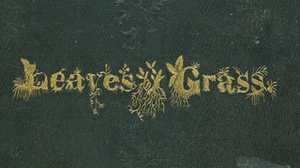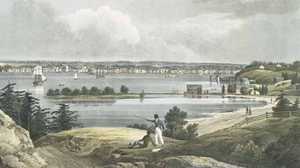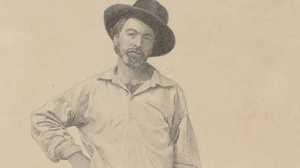Walt Whitman (1819-1892)
Walt Whitman was born in 1819 on Long Island, New York to Louisa and Walt Whitman, both from established local families. Whitman Sr. was a farmer and house builder, interested in real estate speculation. Anticipating a building boom, the family moved to Brooklyn in 1823. Whitman attended public school there until the age of 11, when he left school to help support the growing family.

Early Years
Whitman's parents and seven siblings moved house frequently in and around Brooklyn as his father attempted to cash in on the boom. From his teenage years, he worked every job in the newspaper trade, from printing to writing and editing, and even publishing his own weekly paper, which he delivered to his customers on horseback. In his early twenties he worked as a schoolteacher, but newspaper jobs and freelance writing would be Whitman's main source of income until the Civil War. Most of his employment was in New York and Brooklyn, or on Long Island, but he also spent three months at a newspaper in New Orleans.
In the World
Although he did not have much formal schooling, Whitman was alive to the world around him, wandering through the natural bounty of Long Island as a boy and through the streets of Brooklyn and Manhattan as a young man. Tall and striking (especially after prematurely graying), Whitman was a character others noticed; his natural kindness and empathy made him many friends and admirers. In an era when masses of urban immigrants appalled some observers, Whitman's writing celebrated the laborers, drivers and passing faces of the nation.
His Life's Work
Whitman's first collection of poetry, Leaves of Grass (1855), featured a unique voice. There was no regular rhyme or rhythm to the lines; they mixed elements of prose and verse, in a colloquial and personal style. The subjects of the poems were the self, the body and the multitude of America. These themes would preoccupy Whitman throughout his life. Keeping the book's title, he would revise this collection of poems again and again, adding, subtracting, and editing its contents.
Controversial Content
"The body remained very much Whitman's subject," says Whitman scholar Ed Folsom. Many of his poems celebrated sensual pleasure and sexual desire between men and women. In his own time these were among his most controversial works; pre-eminent contemporary writer and thinker Ralph Waldo Emerson urged him to remove the more erotic texts, but to no avail. The poems resulted in Whitman's dismissal from a government job and later, one of Whitman's publishers was threatened by a local district attorney who considered passages of Leaves of Grass obscene.
Sexuality in Whitman's Era
Although his writings on pleasure and desire attracted criticism, few commented at the time on his "Calamus" poems, which dealt with male-male affectional relationships. While modern readers consider these to refer to homosexuality, readers in Whitman's day, and perhaps Whitman himself, understood the writings to describe intense expressions of same-sex friendships that were common at the time. While Whitman had homoerotic affections, scholars today generally agree that is misleading to label him a "homosexual" since that term did not exist in his time.

Patriot
Whitman's politics also found their way into his work. He was guided by his love of the United States. He considered slavery immoral and supported the free soil position, wishing for new territories to be admitted to the union only if they came in as free states. But he decried the abolitionists as "foolish red-hot fanatics." He worried that extremists on both sides of the debate would lead the country into a war that would tear apart the Union. He was right.
Compassion and Comfort
During the Civil War, the 42-year-old Whitman did not enlist, but traveled to Washington, D.C., offering comfort to wounded soldiers. He worked in a series of clerkships at federal institutions, primarily to support his hospital work. Whitman developed a deep admiration for President Abraham Lincoln and wrote "When Lilacs Last in the Dooryard Bloom'd" and "O Captain! My Captain!" after the president's death.
America's Most Influential Poet
In 1873 Whitman suffered a stroke. He left Washington to stay with his brother George in Camden, New Jersey. Although he intended the stay to be temporary, Whitman's declining health kept him in Camden until his death on March 26, 1892. He left behind a final, "deathbed" revision of Leaves of Grass, the great compendium of poems that over the decades has preserved his reputation as America's most influential poet and one of the most significant writers in the nation's history.







